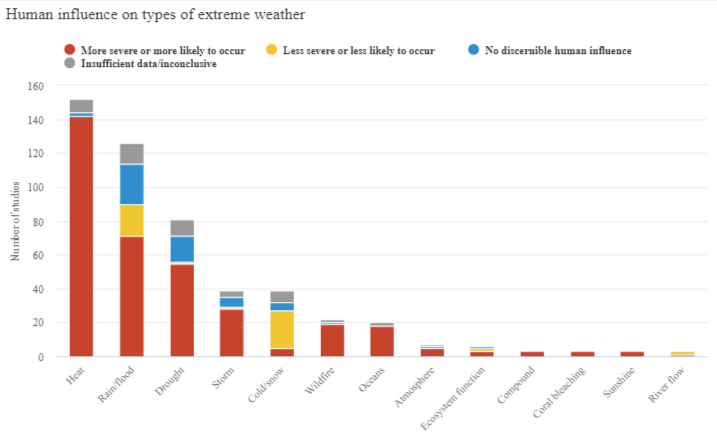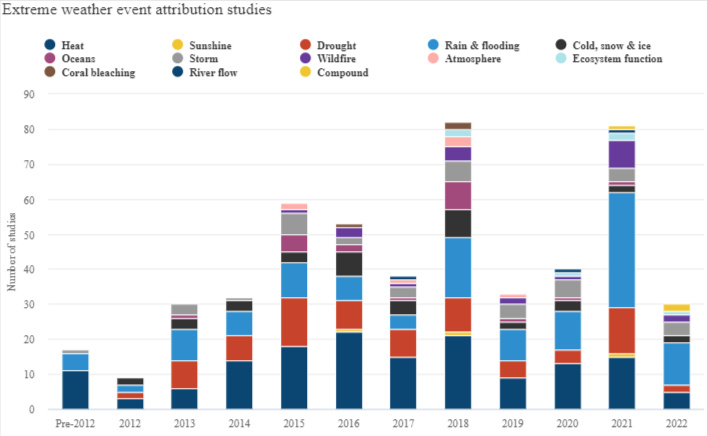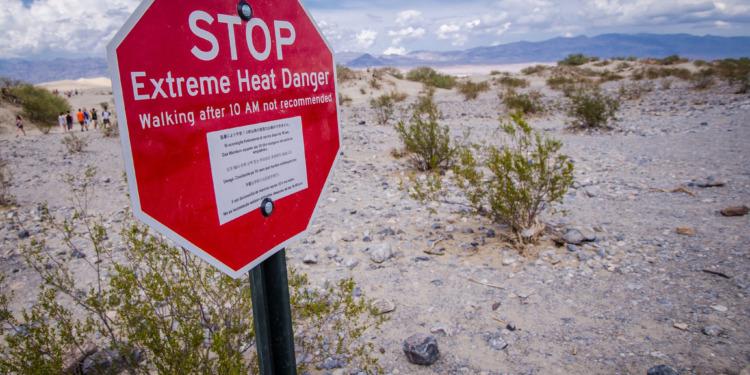Over the last two decades, a field of climate-science research known as “extreme event attribution” has flourished providing bewildering insights into the human fingerprint on extreme weather events such as floods, heatwaves, droughts and storms.
Tangible — often catastrophic — weather events can give substance to the otherwise seemingly abstract concept of anthropogenic climate change.
From wildfires in the US and heatwaves in India and Pakistan to typhoons in Asia and record-breaking rainfall in the UK, scientists have fed climate literature hundreds of studies on weather extremes worldwide.
Since 2017, Carbon Brief maps such studies to track this evolving topic. Unsurprisingly, the result is mounting evidence that human activity is raising the risk of some types of extreme weather, especially those linked to heat.
The main findings of their latest analysis are:
- 71% of the extreme weather events and trends were made more likely or more severe by human-caused climate change;
- 9% of those were made less likely or less severe by climate change, meaning 80% of all events experienced some human impact;
- 93% of extreme heat events or trends were made more likely or more severe by climate change;
- 56% of extreme rainfall or flooding events were made more likely or more severe by human activity;
- 68% of drought events were made more likely or more severe by human activity.
The mapping includes 504 extreme weather events and trends across the globe for which scientists have carried out attribution studies. It considers individual extreme events, such as a wildfire or storm, longer-term trends in extreme weather, such as the change in frequency of flooding or marine heatwaves over time, and compound extreme events, such as the higher likelihood of combined dry and hot events.

The literature of the past 20 years is heavily dominated by studies on extreme heat (30%), rainfall or flooding (25%) and drought (16%), together accounting for more than two-thirds of all published studies.
While heatwaves are the most-studied extreme event in attribution literature, they are becoming less and less interesting for researchers as evidence is already strong enough.

Attribution science is increasingly considering the impacts of extremes, rather than focusing purely on the weather event, meaning it could be translated into “legal causality” — writes Carbon Brief — and used in courts as it bridges the gap between a general understanding that human-induced climate change induces negative impacts and concrete evidence of the role of climate change at a specific location for a specific extreme event.
Related articles: Climate Reporting: Why People Won’t Listen | Big Oil Sees Record Profits
In fact, attribution research has also identified signals of human influence in other indicators of a changing climate, such as increasing average temperature, rising lake temperatures or sea level rise.
Recent research has even been able to detect the fingerprint of climate change “from any single day in the observed global record since early 2012, and since 1999 on the basis of a year of data”.
And this is getting worse. In 2017, 68% of events were found to have a human impact (with 63% made more severe or likely by climate change and 6% less so). We’re now up to 80% (with 71% of the extreme weather events made more likely or severe and 9% less so).
Recent studies have concluded that several heat extremes would have been impossible without human influence on the climate. These include Siberia’s heatwave of 2020, the Pacific north-west “heat dome” event of 2021 and Europe’s record-breaking summer of 2021 (and let’s be prepared for the outlook of summer 2022, which promises to be just as bad — if not worse).
However, finding that climate change contributed to an event is not the same as saying it caused that event. Attribution science is about understanding if the likelihood or magnitude of a particular event is different from what it would be in a world that was not warming.
And scientists are constantly looking for improved ways to broader the scope of their work.
One of the major challenges is to expand research to cover a larger and more diverse geographical area due to limitations in the quality and availability of data and appropriate models. The attribution map highlights, for example, that there are relatively few studies of extreme weather in Africa and South America.
Scientists are also becoming faster at uncovering climate attributions, sometimes just days after an event has occurred, and might at some point be able to carry out real-time analyses.
Moving forward, international collaboration will be key for developing new techniques and processes, especially when it comes to advanced forecasting, which could provide means to timely reach out to people in risky areas.
Attribution research can also look back in time, inspecting how past events would behave with present-day levels of greenhouse gases. However, this isn’t something for the faint-hearted: in 2020, some scientists found that the return period of a once 1-in-100-year heatwave summer would be reduced to about 1-in-40 years in today’s climate.
Editor’s Note: The opinions expressed here by the authors are their own, not those of Impakter.com — In the Featured Photo: Extreme heat danger sign in death valley. Featured Photo Credit: m01229.










